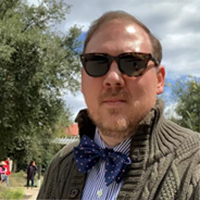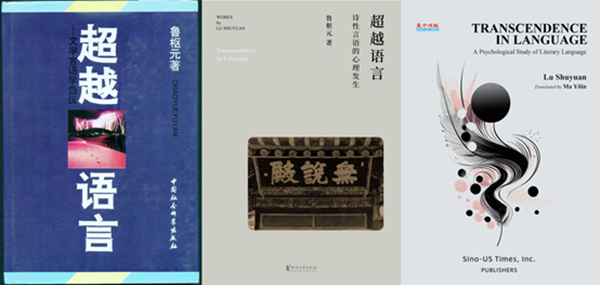美东时间2025年3月29日晚8时,美西时间3月29日下午5时,北京时间3月30日上午9时,来自美国和中国十几所知名高校的专家学者在线上齐聚一堂,共同参加由美国中美后现代发展研究院主办的过程哲学视域下的语言学研究暨鲁枢元教授语言学思想国际研讨会。美国阿兹塞太平洋大学外语学院教授尼森·博纳在发言中说,鲁教授在《超越语言》一书中,通过语言学、心理学与文学批评的跨学科研究,揭示了文学语言的独特本质。其核心观点是文学语言通过心理深度、情感共鸣与个体创造力,超越了结构主义的限制。

以下是尼森·博纳 教授发言全文,马伊林、杨婧妮译
语言的心理维度与生态维度
——鲁枢元教授《超越语言:诗性言语的心理发生》评析
尼森·博納
引言:东西方诗歌传统对比
诸位好。今天,我想先从东西方诗歌的区别谈起,然后再深入分析鲁枢元教授的《超越语言》一书。中国诗歌作为最古老且最精炼的文学传统之一,深深植根于哲学思想、自然意象以及情感与理性的平衡。它源自古代口头传统,并在周代形成书面体系,如《诗经》反映了农耕生活、宫廷礼仪与民间情感。随着朝代更迭,诗歌艺术蓬勃发展,诗人们完善了律诗与绝句形式,将个人情感与社会意识相融合。中国古典诗歌注重音调韵律与对仗工整,通过声音、意象与意义的协调,营造含蓄的美学境界。受道家、儒家思想影响,诗歌强调对自然的敬畏、生命易逝的感悟与朴素之美的追求,佛教思想则为后期作品注入冥想深度。中国诗歌以简练精准的语言、含蓄而非直白的方式,创造出静默中引发共鸣的审美体验。其诗性源于语言的凝练,未言明的意蕴与生动的意象,引导读者进入沉思之境。通过精妙的简洁与象征,中国诗歌在“有与无”“静默与意义”的交织中成就其诗性本质。
相比之下,西方诗歌源于古代口头传统和史诗叙事,这些传统深深植根于古希腊罗马诗歌的严谨格式之中,如荷马史诗《伊利亚特》与《奥德赛》中的六音步格式,或维吉尔的《埃涅阿斯纪》。不同于中国诗歌的凝练抒情,西方诗歌通过史诗与戏剧形式发展,常具教化或英雄叙事功能。中世纪宗教诗歌与宫廷诗歌盛行,而文艺复兴时期则重拾古典技巧,强调韵律、押韵与个人表达。18、19世纪浪漫主义转向个人情感与崇高体验,诗人如华兹华斯与济慈将大自然的广阔作为人类灵感的源泉。20世纪现代主义打破传统形式,艾略特、庞德等人通过自由诗、碎片化与实验意象质疑诗歌规范。相较于中国诗歌的含蓄之美,西方诗歌常探讨显性哲学命题、宏大叙事与自我心理深度。从十四行诗到自由诗再到后现代自由诗,声音、结构与形式的创新定义了其演变轨迹。西方诗歌的诗性源于形式与自由的张力,在保持与韵律、隐喻及语言游戏的本质联系中不断自我革新。
尽管两大诗歌传统都通过强化语言运用追求诗性,但对美、结构与意义的理解存在差异:中国诗歌倾向于简练、音调精妙与自然作为情感的镜像,西方诗歌则构建复杂隐喻、延展叙事与内省结构。中国诗歌重视留白而非直陈,为读者的想象留出空间;西方诗歌兼收抒情简洁与思辨探索。虽然都经历严格的形式主义阶段,但西方诗歌在过去两个世纪的形式演变显得尤为激进。此外,中国诗歌追求与自然的和谐,西方诗歌则在敬畏自然与征服自然间摇摆。两种诗歌传统中诗性或许都源于人类想要超越语言工具性的本能冲动——通过将语言升华为艺术形式,捕捉那些转瞬即逝的情感、宏伟的思想,以及存在中不可言说的本质。无论是捕捉瞬间微妙,还是书写宏大主题,诗歌始终是将人类经验提炼为最具共鸣与超越性形式的艺术。
基于上述对两种不同文化中的诗歌对比,我们不禁追问:文学语言的本质是什么?它如何超越日常言语的呢?鲁教授在《超越语言》一书中,通过语言学、心理学与文学批评的跨学科研究,揭示了文学语言的独特本质。其核心观点是文学语言通过心理深度、情感共鸣与个体创造力,超越了结构主义的限制。鲁教授将其理论置于结构主义语言学的批判对话中,通过广泛借鉴索绪尔、洪堡特、巴特与巴赫金等学者的理论,形成了关于“文学言语如何从深层心理与文化脉络中生成”的细致阐释。接下来,我将分析鲁教授的核心论点、与主要学者的互动,以及该研究的学术价值。
《超越语言》的核心论点与论据
1.文学语言的心理学基础
鲁枢元教授认为,文学语言根植于区别于日常语言的心理过程。他批评结构主义的语言观,尤其是乔姆斯基“同质语言系统”理论,主张语言表达应当是一种有机的、动态的过程。借助皮亚杰的认知心理学,他指出语言习得和表达深受潜意识过程的影响,使得文学作品能够在更高的心理层面上进行创作。书中引用原始语言研究与现代心理实验,证明言语的情感与认知基础。为反对结构主义的僵化,鲁教授通过结合认知科学和发展语言学的研究成果,将文学语言定位为一个不断发展的“有生命的实体”,而非静态系统。
2.结构主义批评与替代语言模型
本书一大贡献在于对结构主义语言学的批评,特别是对普洛普、格雷马斯和托多罗夫等学者的观点提出质疑,他们试图将文学叙事简化为固定的语法或功能结构。鲁枢元指出,这样的简化剥夺了文学的情感和美学力量,用僵化的形式主义代替了生动的诗性表达。他将此与巴赫金的对话理论进行了对比,后者强调语言的异质性和动态性。巴赫金的“动态的、充满生机和活力的语言”这一概念,为鲁教授的论点提供了关键支撑——文学语言通过其流变性与对标准化的抗拒,超越了语言的符号化。为证明这一观点,鲁教授通过历史文本的分析,展示了中国古典诗歌与现代主义文学如何超越了结构主义的范畴。
3.修辞与创造力的作用
除了语言哲学,鲁教授还探讨了修辞与创作机制如何助力文学语言的超越性。他区分了“延续修辞”(有意识的、结构化的创作)与“瞬间修辞”(自发的、潜意识的创作),并将后者与现代主义文学中的意识流技巧相联系。通过引用瓦莱里的写作风格区分,并与中国文学传统进行比较,鲁教授提出文学语言的超越性诞生于技艺锤炼与灵感迸发的互动。他对中国古代诗歌以及现代作家如莫言作品的分析支持了这一论点,表明文学言语往往超越理性创作。
《超越语言》的研究方法与学术贡献
鲁枢元教授的学术研究涉及多个争论领域,尤其针对“语言结构”与“主体能动性”之间的辩论。他的观点与20世纪文学研究中占主导地位的结构主义与形式主义传统对立,更倾向于现象学与存在主义的视角。作者既引用洪堡特的理论,主张语言表达具有个体性与创造性,又结合海德格尔的哲学思想,强调诗性语言的存在维度。此外,鲁教授并将争论范围扩展至心理语言学领域,通过引入荣格与马斯洛的理论,他论证了文学语言是通向超越性心理状态的桥梁。这种跨学科整合为文学语言研究的范式革新提供了有力支撑。
本书采用主题式结构,从语言起源的基础性讨论出发,逐步推进至对结构主义的批判、心理机制分析以及修辞策略研究。鲁教授兼顾历史与当代文学案例,展开了不同语言传统的比较分析。研究方法融合文本细读、理论阐释与心理分析。第一手材料包含中国古代诗歌、现代主义小说及实验语言学研究成果,第二手资料则涵盖从古典哲学典籍到当代语言学批评著作的广泛谱系。
《超越语言》通过突破结构主义范式,强调文学言语的心理维度与创造性特质,为文学语言学领域作出重要贡献。其跨学科视角揭示了语言超越形式结构的运作机制,为文学理论与认知科学的对话提供了新可能。未来的研究可以进一步拓展鲁教授的观点,将神经认知方法应用于文学分析,深入探究大脑活动与文学超越性体验之间的关联机制。同时,通过开展东西方文学传统的比较研究,能够深化关于文学语言的普遍性与文化特殊性的理论探讨。总之,鲁枢元教授的著作为理解语言如何超越交流功能、实现艺术与心理双重维度的深层表达开辟了新的路径。
在耶鲁大学论坛对鲁枢元著作的探讨中,与会学者对其研究进行了深度评析,着重强调该著作的跨学科属性与开创性的贡献。约翰·格瑞姆教授与玛丽·伊芙琳·塔克教授指出,鲁教授的核心论点在于:文学语言通过其深层心理维度与生态维度,实现了对结构主义桎梏的突破。他们赞赏鲁枢元教授结合了柏格森与索绪尔的哲学传统,论证文学表达如何突破语言结构,进入直觉、自发性以及人类与生物圈深刻联系的领域。同时进一步剖析了书中提出的文学“内向转”概念,即文学语言促进人类主体意识与集体认知的深化。耶鲁学者特别欣赏鲁枢元教授融入海德格尔的存在主义思想和恩斯特·卡西尔的符号形式哲学,这佐证了其主张,语言不仅是交际工具,更是人类经验的最高抽象物。他们还认可鲁教授的“三分法”框架——将语言生态系统划分为自然、社会和精神维度——将其思想与中国哲学传统和西方生态思想,特别是菲利克斯·加塔利的“三重生态学”联系起来。评论者认为,鲁教授强调诗性语言作为人类表达与环境意识的桥梁,为当代语言学及生态学话语做出了重要贡献。通过融合中国道家美学、西方现象学和现代认知语言学,鲁教授这本书被定位为重新定义语言在塑造人类思想和生态意识方面作用的先锋之作。
在柏拉图的《申辩篇》中,苏格拉底指出,诗人们创作并不是靠智慧,而是靠天分、凭灵感,他们如同预言家,虽然说出很多美好的话,却并不理解其中的含义。这种灵感观在阅读鲁教授著作时获得新解——当作者援引袁枚“凡有著作,特寡思功,须其自来,不以力称”之论时,恰与万里之外的华兹华斯形成思想共振。后者在《抒情歌谣集》中写道:“诗是强烈情感的自然流露,它源于在平静中回忆起来的情感。” (标题为编者所加)

鲁枢元著:《超越语言》(初版),中国社会科学出版社1990年版
鲁枢元著:《超越语言》(修订版),浙江文艺出版社2023年版
Lu Shuyuan: TRANSCENDENCE INLANGUAGE A Psychological Study of Literary Language
Sino-US Times, Inc.1924
内森·博纳(Nathan Bonar)美国克莱蒙研究生大学英国文学专业博士,阿兹塞太平洋大学外语学院教授。出生于田纳西州,在奥斯汀佩伊州立大学完成第三个硕士学位后,赴克莱蒙研究生大学攻读博士学位。已发表《薄霜覆煎饼》《支点》《诙谐自然》等多篇诗作,学术论文《B-E-B-E-B-E-B-E之变奏》刊载于《Em-dash》期刊。现任阿兹usa太平洋大学外语学院英语作为第二语言教授,拥有十五年教学经验,教授课程涵盖法语、ESL、写作、美国文化、英国文学及诗歌。
Analysis of Transcendence in Language: A Psychological Study of Literary Language by Lu Shuyuan
Introduction
Good morning, afternoon, or evening to you, depending on where you arejoining us. Today, I would like to start with some foundational comments toclarify Western and Eastern poetry before I provide insights into Lu Shuyuan’sbook Transcendence in Language: A Psychological Study of Literary Language.Let’s begin withChinese poetry, one of the oldest and most refinedliterary traditions. It is deeply rooted in philosophical thought, nature, andthe balance between emotion and restraint. Emerging from ancient oraltraditions and crystallizing into written form during the Zhou Dynasty, earlypoetry like the Book of Songs (Shijing) reflects agrarian life, courtrituals, and folk expressions. Later dynasties saw an unparalleled flowering ofpoetic artistry, with poets perfecting regulated verse and quatrains, blendingpersonal emotion with social consciousness. Classical Chinese poetry oftenemploys tonal patterns and parallelism, where the interplay of sound, imagery,and meaning is carefully harmonized. Daoist and Confucian influences emphasizea reverence for nature, a sense of transience, and an appreciation forsimplicity, while Buddhist thought infuses later works with meditative depth.The brevity and precision of Chinese poetry, along with its reliance onsuggestion rather than explicit declaration, create an aesthetic of quietresonance. Its poeticness arises from a distilled economy of language, whereunspoken implications and evocative imagery engage the reader in acontemplative experience. Through a mastery of concision and symbolism, Chinesepoetry achieves its poetic essence in the interplay between absence andpresence, silence and meaning.
In contrast, Western poetry, originates from ancient oral traditions andepic storytelling that took root in the highly structured forms of Greek andRoman poetry, such as the hexameter of Homer’s Iliad and Odysseyor Virgil’s Aeneid. Unlike the compact lyricism of Chinese poetry,Western verse developed through both epic and dramatic forms, often serving adidactic or heroic function. The Middle Ages brought religious and courtlypoetry, while the Renaissance revived classical techniques, emphasizing meter,rhyme, and individual expression. Romanticism in the 18th and 19th centuriesshifted poetry toward personal emotion and the sublime, with poets likeWordsworth and Keats embracing nature’s vastness as a source of humaninspiration. The 20th century fractured traditional forms, with modernists suchas T.S. Eliot and Ezra Pound questioning poetic conventions through free verse,fragmentation, and experimental imagery. Unlike the implicit, restrained beautyof Chinese poetry, Western poetry frequently explores overt philosophicalarguments, grand narratives, and the psychological depths of the self. Sound,structure, and formal innovations—ranging from sonnets to blank verse topostmodern free verse—define its evolving nature. The poeticness of Westernpoetry arises from its tension between form and freedom, its ability toreinvent itself while sustaining an intrinsic connection to rhythm, metaphor,and linguistic play.
Both traditions seek poeticness through an intensified use of language, butthey diverge in how they conceive of beauty, structure, and meaning. Chinesepoetry often leans on brevity, tonal subtleties, and nature as a reflectivemirror of human emotion, while Western poetry frequently builds complexmetaphors, extended narratives, and personal introspection into its structure.The Chinese poetic ideal values suggestion over statement, leaving space forthe reader’s imagination, whereas Western poetry has historically embraced bothlyrical conciseness and expansive, discursive exploration. While both traditionsunderwent periods of strict formalism, Western poetry has demonstrated a moreradical evolution in form, particularly in the last two centuries. Furthermore,whereas Chinese poetry often seeks harmony with the natural world, Westernpoetry has fluctuated between reverence for nature and the assertion of humandominance over it. The origin of poeticness in both traditions may lie in thehuman impulse to elevate language beyond mere communication, transforming itinto an art that captures fleeting emotions, grand ideas, and the ineffableaspects of existence. Whether through the subtle evocation of a single momentor the sweeping articulation of grand themes, poetry emerges as thedistillation of human experience into its most resonant and transcendent form.
From this immensely brief overview of poetry in two different cultures, onemight ask what is the nature of literary language, and how does it transcendordinary speech? In Transcendence in Language: A Psychological Study ofLiterary Language, Lu Shuyuan embarks on an interdisciplinary explorationof linguistic philosophy, psychology, and literary criticism to uncover theunique essence of literary language. His central thesis argues that literarylanguage surpasses structuralist constraints through psychological depth,emotional resonance, and individual creativity. Lu situates his argument withina critical dialogue that challenges structuralist linguistics, drawing upon adiverse range of scholars, including Ferdinand de Saussure, Wilhelm von Humboldt,Roland Barthes, and Mikhail Bakhtin, to construct a nuanced understanding ofhow literary speech emerges from deep psychological and cultural currents. Inmy remaining time, I would like to analyze Lu’s core arguments, his engagementwith major scholars, and the historiographical significance of his work.
Arguments,Evidence, and Warrants
1. ThePsychological Foundations of Literary Language
Lu posits that literary language is rooted in psychological processes thatdifferentiate it from ordinary language. He critiques structuralist approaches,particularly Noam Chomsky’s notion of a homogeneous language system, arguinginstead for an organic and dynamic view of linguistic expression. Drawing fromJean Piaget’s cognitive psychology, Lu asserts that language acquisition andexpression are deeply intertwined with subconscious processes, enablingliterature to operate at a heightened psychological level. His primary sourcesinclude studies of primitive languages, as well as modern psychologicalexperiments demonstrating the emotional and cognitive underpinnings of speech.In countering structuralist rigidity, Lu employs rhetorical strategies thatappeal to cognitive science and developmental linguistics, positioning literarylanguage as an evolving, living entity rather than a static system.
2. StructuralistCritique and Alternative Linguistic Models
One of Lu’s major contributions is his critique of structuralistlinguistics, particularly the approaches of Vladimir Propp, Algirdas JulienGreimas, and Tzvetan Todorov, who sought to reduce literary narratives to fixedgrammatical or functional structures. Lu argues that such reductions stripliterature of its emotional and aesthetic power, replacing vivid poeticexpression with rigid formalism. He contrasts this with Bakhtin’s theory ofdialogism, which emphasizes the heterogeneity and dynamism of language. Bakhtin’snotion of “living and dynamic” speech underpins Lu’s argument that literarylanguage transcends linguistic codification through its fluidity and resistanceto standardization. To support this claim, Lu analyzes historical texts,demonstrating how classical Chinese poetry and modernist literature alike eludestructuralist categorization.
3. The Role ofRhetoric and Creativity
In addition to linguistic philosophy, Lu examines the rhetorical andcreative mechanisms that contribute to literary transcendence. He distinguishesbetween “delayed rhetoric” (conscious, structured composition) and “instantrhetoric” (spontaneous, subconscious creativity), aligning the latter with thestream-of-consciousness techniques found in modernist literature. Byreferencing Valéry’s division of writing styles and comparing it to Chineseliterary traditions, Lu builds an argument that literary transcendence emergesthrough an interplay between structured craftsmanship and spontaneousinspiration. His analysis of primary texts, including classical Chinese poetryand works by modernist writers such as Mo Yan, supports this claim,demonstrating that literary speech often operates beyond rational composition.
Historiographyand Contribution to Debate
Lu engages with multiple historiographical debates, particularly thoseconcerning the role of structure versus agency in language. His arguments arepositioned against structuralist and formalist traditions that dominated20th-century literary studies, aligning more closely with phenomenological andexistentialist perspectives. He references scholars such as Humboldt, whoargued for the individuality and creativity inherent in linguistic expression,and Heidegger, who emphasized the existential dimensions of poetic language.Furthermore, Lu extends the debate into the realm of psychological linguistics,incorporating the theories of Carl Jung and Abraham Maslow to argue thatliterary language is a conduit for transcendent psychological states. Bybridging these disparate fields, Lu makes a compelling case for reconsideringthe study of literary language within an interdisciplinary framework.
Organization andMethod
Lu structures his book thematically, moving from foundational discussionsof language origins to critiques of structuralism, psychological mechanisms,and rhetorical strategies. He integrates both historical and contemporaryliterary examples, providing a comparative analysis across different linguistictraditions. His methodological approach is eclectic, combining close readingsof literary texts with theoretical expositions and psychological analysis.Primary sources include ancient Chinese poetry, modernist fiction, and experimentallinguistic studies, while secondary sources range from classical philosophicaltexts to contemporary linguistic criticism.
Conclusion:Significance and Further Research
Lu Shuyuan’s Transcendence in Language contributes significantly tothe study of literary linguistics by challenging structuralist paradigms andemphasizing the psychological and creative dimensions of literary speech. Hisinterdisciplinary approach provides a fresh perspective on how languageoperates beyond rigid formal structures, offering insights that resonate withboth literary theorists and cognitive scientists. Future research could expandupon Lu’s ideas by applying neurocognitive methodologies to literary analysis,further exploring how brain activity correlates with the experience of literarytranscendence. Additionally, comparative studies between Western and Easternliterary traditions could deepen the discourse on the universality versuscultural specificity of literary language. In sum, Lu’s work opens avenues fora richer understanding of how language transcends mere communication to achieveartistic and psychological profundity.
During the Yale Forum review of Lu’s book, they present an in-depth andappreciative analysis of his work, emphasizing its interdisciplinary andgroundbreaking contributions. The reviewers, John Grim and Mary Evelyn Tucker,highlight Lu’s central argument that literary language transcends structuralistconstraints through its deep psychological and ecological dimensions. Theycommend Lu for bridging the philosophical traditions of Henri Bergson andFerdinand de Saussure, demonstrating how literary expression moves beyond merelinguistic structures into a realm of spontaneity, intuition, and deep humanconnection to the biosphere.
The reviewfurther explores Lu’s concept of an "inward turn" in literature,where he suggests that literary language fosters a deeper awareness of humansubjectivity and collective consciousness. The Yale scholars particularly appreciateLu’s incorporation of Heidegger’s existential ideas and Ernst Cassirer’sphilosophy of symbolic forms, which reinforce his claim that language is notjust a vehicle for communication but a means of engaging with the ineffabledimensions of human experience. They also acknowledge Lu’s innovative “trichotomy”framework—dividing the linguistic ecosystem into natural, social, and spiritualdimensions—linking his ideas to both Chinese philosophical traditions andWestern ecological thought, notably Felix Guattari’s Three Ecologies.The reviewers assert that his emphasis on poetic language as a bridge betweenhuman expression and environmental consciousness offers a vital contribution tocontemporary linguistic and ecological discourse. By incorporating ChineseDaoist aesthetics, Western phenomenology, and modern cognitive linguistics, LuShuyuan’s work is positioned as a pioneering effort to redefine the role oflanguage in shaping human thought and ecological awareness.
I will leave you with one last realizationI gained: In The Apology, Socrates argues that “poets create not throughwisdom, but by a sort of genius and inspiration; they are like diviners orsoothsayers who also say many fine things, but do not understand the meaning ofthem”. A new notion of inspiration came in reading Lu’s book, when he invokesYuan Mei’s words “all works should be created through the spontaneousoutpouring of mind rather than ‘hard’ thinking” because they so well echo withanother contemporary poet from around the globe, William Wordsworth, who saysin Lyrical Ballads, “poetry is the spontaneous overflow of powerfulfeelings; it takes its origin from emotion recollected in tranquility”.
相关链接:
鲁枢元语言学国际研讨会01:过程哲学视域下的语言学研究暨鲁枢元教授语言学思想国际研讨会成功举办
鲁枢元语言学国际研讨会02:让诗性语言照亮充满生机的地球
鲁枢元语言学国际研讨会03:一部极具现实意义的旧作
鲁枢元语言学国际研讨会04:全息的、生态的、宇宙论的语言学贡献
鲁枢元语言学国际研讨会05:语言与生生不息的地球
鲁枢元语言学国际研讨会06:《超越语言》富有十足的创新力和前瞻性
鲁枢元语言学国际研讨会07:AI生成語言視閾下回視魯樞元的《超越語言》
鲁枢元语言学国际研讨会08:语言的心理维度与生态维度
鲁枢元语言学国际研讨会09:从结构主义到生态主义
鲁枢元语言学国际研讨会10:运用语言最终是为了超越语言
鲁枢元语言学国际研讨会11:《超越语言》的学术贡献
鲁枢元语言学国际研讨会12:《超越语言》的学术贡献
鲁枢元语言学国际研讨会13:鲁枢元教授生态政治中的三元语言
鲁枢元语言学国际研讨会14:请给人性留下一点空间




